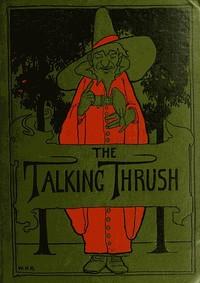Read this ebook for free! No credit card needed, absolutely nothing to pay.
Words: 14241 in 3 pages
This is an ebook sharing website. You can read the uploaded ebooks for free here. No credit cards needed, nothing to pay. If you want to own a digital copy of the ebook, or want to read offline with your favorite ebook-reader, then you can choose to buy and download the ebook.


: The Talking Thrush and Other Tales from India by Crooke William Rouse W H D William Henry Denham Robinson W Heath William Heath Illustrator - Folklore India
PREFACE
It is therefore to this point that we address our examination, and in no unfriendly spirit; for the object Mr. Spencer had in view was one which appealed to every sentiment and every intellectual aspiration within us. But we feel bound to say how sadly we have been disappointed. We have found the object of our admiration to be like Nebuchadnezzar's dream god, a thing apparently perfect and complete in configuration but like the image compounded of iron and clay and precious stones inevitably falling to pieces under the strain of sustained criticisms.
Mr. Spencer's philosophic conception was indeed imposing, and before its magnificent proportions many have bowed down in sincere respect. But his cosmical scheme when carefully examined proved to be constructed of terms which had no fixed and definite meaning, which were in fact merely symbols of symbolic conceptions, conceptions themselves symbolic because they were not understood--and the moment we began to put them to use as having definite values they landed us forthwith in alternative contradictions! Then to effect cosmical evolution, which is a process of imperceptible objective change, what was necessary, but to adopt a system of imperceptible word changes, so that the imperceptible word changes accompanying the imperceptible objective changes should lead us in the end to the completed results, and the process of evolution should thus be made comprehensible! In this manner over the spaces of an enormous work have we been skilfully led by a master of language till we find ourselves in imagination following out mentally the actual processes of the universe. But after all it has only been a process, in our own minds, of the skilful substitution of words!
Errors to be successful must be big and bold. Fallacies of reasoning are detected on a medium scale, but when they are "writ large" it is difficult to detect them. Trains of syllogisms are sometimes more effective because they are vast than because they are true. Let them be imposing in their language and grand in their proportions, we naturally bow down to power, even if it is only power of largeness. When dealing with Mr. Spencer's reasonings we feel a certain awe as if we were contradicting the forces of the universe--seemingly allied to him. We feel conscious of an impertinence in treating of such great matters, dealt with in such a mighty sweep--disdainful of precision and consistency. The transformations and evolutions of reasoning in Mr. Spencer's works are no less wonderful than his treatment of words. The mind is swept along by an indiscernable but mighty flow, and sometimes after mysterious disappearances of consecutiveness between volumes or chapters, we find ourselves landed in a satisfied but bewildered manner at a conclusion about which we cannot but wonder however we arrived there.
But the real difficulty appears when the necessity for exposition arises. If one undertakes to explain, if one has to condense and solidify for the purpose of teaching, if one wishes to make others understand, and share the knowledge one has attained, then indeed our difficulties commence. What seemed so grand and alluring to look at will not stand the ordinary handling of scientific language and logical statement as between man and man. The illusion vanishes, the system has gone. In these remarks we speak only of Mr. Spencer's cosmical system. Of the general value of this work as a philosopher we express no opinion. In the estimation of competent thinkers it is very great. Fiske, Youmans, Carveth Read, Ribot, Maudsley, Clifford, Sully, Grant Allen, Gopinay, and others are all working on Spencerian lines, but we do not understand that they accept the cosmical explanation of Mr. Spencer. He marks not the age of complete accomplishment but the age of transition. He has not grasped the solution of problems, but he has shewn the direction of future studies. He has failed in his grand endeavour, but he has shown what to aim at and has pointed the way. Much of his detailed work has been good and effective, and therefore one feels some compunction in writing of him so severely. Nevertheless a man of such eminence must not be held sacred from criticism, but on the contrary, just by reason of his eminence and consequent influence, must his work be well examined before it is accepted and approved. This is the task we have set ourselves and which may now be considered as complete. We have approached the study without any prepossessions, and we have endeavoured, while being very strict, to be perfectly fair and honest in our presentations of Mr. Spencer's theories. Naturally the work has been long and tedious, and where so many contradictory and indistinct expressions of opinion are given it has been necessary to deal largely in quotations. This has been done in justice both to ourselves and to our author. If we have succeeded in bringing out the main lines of thought for the future use of students we shall have accomplished our end. It is only by very strict thinking and discussion that truth is finally evolved.
This is a difficulty which has not been overlooked by Mr. Spencer. He would escape it in two ways. Firstly by a mysticism, through which after the definite meaning he has given to his terms has been found to fail in actual work he changes all his fundamental terms into "symbolic conceptions." Why? Because they have no meaning; and if you give them a meaning the conclusions from them land the student in irreconcilable contradictions. Out of this mysticism no progress is possible. Secondly by means of the "double aspect" theory. According to this theory everything is both material and subjective, as you choose to regard it, and may be explained and accounted for in laws of the relations of either set of factors. It is true that phenomena may be so described, but it is not true that they can be so explained. There is an undoubted concomitance between the bodily act and the conscious feeling, but the real question is this,--Does the conscious feeling wholly depend upon the physical series of events and has itself no effects on the physical series? Is it produced without producing? Is it something occurring in connexion with certain motions in the nerves of the organism and therefore dependent upon and wholly produced by the physical factors in their interrelation, according to the known chemical and physical laws of the factors? If it is so determined, and does not determine as part in a chain of causation it cannot be said to interfere with the materialistic explanation. That is complete in itself. The only question left is this:--How comes it about that some portions of the physical series of phenomena have this strange accompaniment of consciousness? A very interesting but comparatively unimportant question. The theory that phenomena have two sides is of no use whatever in the endeavour towards the statement of a cosmical formula of explanation. The result of our studies is to the effect that there are physical factors and subjective factors alike produced and producing. We aim at the statement of their law of correlation, and in this we would seek the cosmical formula. We however seek it in vain, and we do not think it possible to attain it. In the meantime we look to the development of the subjective factor in life, and more especially in human life, as a fact of the greatest interest, the more so that we discern in that development an orderly progress in a well marked manner; and it is our task to understand the laws of that orderly development. This study has to be undertaken along with the study of material Evolution; and although we may not fully understand our problem, there is much that we can understand and much to make our views large and sympathetic and our minds expansive in working out the great questions that are set before us.
The study of Ethics from the Evolutionist's point of view assumes an altogether different phase from the old methods of inquiry and rests upon an altogether different basis. Its ground of authority is seen to rest in the very nature of humanity and does not come to him as an imposed law. Confidence is first shaken and then fully restored. From the new point of view the merit of all preceding systems is seen, and how they all fall into harmony in a wonderful manner in the consensus of mutual support and enforce ethical law by an united authority.
The chief merit of Mr. Spencer's "Data of Ethics" is that it puts the study upon an entirely new basis in grafting it upon the study of the larger science of Biology. Heretofore the study has been isolated, and supposed to be complete within its own borders. Henceforth no professor or student will be considered competent to express opinions without being well grounded in the study of Biological and Psychological evolution. Ethics, along with Sociology, must be studied as part of the greater movement.
FOOTNOTE:
"Revue Philosophique," Dec. 1883.
ON MR. SPENCER'S DATA OF ETHICS.
ETHICS AND THE UNIFICATION OF KNOWLEDGE.
Free books android app tbrJar TBR JAR Read Free books online gutenberg
More posts by @FreeBooks

: Ομήρου Οδύσσεια Τόμος Δ by Homer BCE BCE Polylas Iakovos Translator - Epic poetry Greek; Odysseus King of Ithaca (Mythological character) Poetry


: Ομήρου Οδύσσεια Τόμος Γ by Homer BCE BCE Polylas Iakovos Translator - Epic poetry Greek; Odysseus King of Ithaca (Mythological character) Poetry






